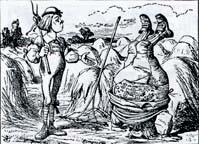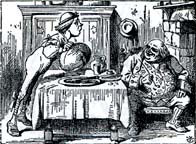Alice in Wonderland upsets conventional Victorian notions of adult-child relationships. In Victorian England, adults were supposed to be role models, instructing children in the ways of maturity. The prevalent moral tales of the period illustrate this notion. When Alice recites such a tale in Wonderland, however, it comes out differently.



'You are old, Father William,' the young man said,
'And your hair has become very white;
And yet you incessantly stand on your head —
Do you think, at your age, it is right?'
'In my youth, Father William replied to his son,
'I feared it might injure the brain;
But, now that I'm perfectly sure I have none,
Why, I do it again and again.'
'You are old,' said the youth, 'as I mentioned before,
And have grown most uncommonly fat;
Yet you turned a back-somersault in at the door —
Pray, what is the reason of that?'
'In my youth,' said the sage, as he shook his grey locks,
'I kept all my limbs very supple
By use of this ointment — one shilling the box —
Allow me to sell you a couple?
The poem continues in that fashion for several more stanzas. The youth asks Father William question after question about his absurd habits as if he is some great repository of wisdom, and with his answers Father William reveals that he lacks the values conventional moral tales intend to instill. In the second stanza he says he is "perfectly sure" he has no brain. In the fourth he takes advantage of the youth's respect and tries to make some money off him. The old man shows himself as an unsuitable and absurd role model.
Alice encounters many adults like Father William in her travels. Though often confused, she is sensible and mature in an absurd adult world. Wonderland and Looking Glass Land are both distortions of the real world, so one could argue that Carroll considers this a distortion of real adult-child relationships. Looking Glass Land, however, literally reflects the real world, so Carroll may believe the relationships he describes reflect reality.
Questions
1. The Catepillar mentions "You are old, Father William" as if it has a counterpart in the real world. If it does, what is it? Google reveals the original poem, "The Old Man's Comforts and How He Gained Them" by Robert Southey:
"You are old, father William," the young man cried,
"The few locks which are left you are grey;
You are hale, father William, a hearty old man;
Now tell me the reason, I pray."
"In the days of my youth," father William replied,
"I remember'd that youth would fly fast,
And abus'd not my health and my vigour at first,
That I never might need them at last."
"You are old, father William," the young man cried,
"And pleasures with youth pass away.
And yet you lament not the days that are gone;
Now tell me the reason, I pray."
"In the days of my youth," father William replied,
"I rememberd that youth could not last;
I thought of the future, whatever I did,
That I never might grieve for the past."
"You are old, father William," the young man cried,
"And life must be hast'ning away;
You are cheerful and love to converse upon death;
Now tell me the reason, I pray."
"I am cheerful, young man," father William replied,
"Let the cause thy attention engage;
In the days of my youth I remember'd my God!
And He hath not forgotten my age."
2. Carroll's parody has simpler syntax and flows better off the tongue than the original. What, if anything, does this say about the two authors' differing attitudes towards children?
3. This poem is one of a number of passages that parody specific works. Is the work as whole a parody as well, of a more unspecific nature? Is it a parody of adult life?
4. How do Carroll's views of children compare to those of Antoine de Saint-Exupery, the author of Le Petit Prince?
Last modified 11 March 2009